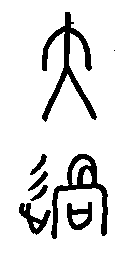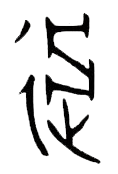I Ching, Yijing or Zhou Yi
"Oracle of the moon": © 2000 LiSe
 Yi Jing, Oracle of the Moon
Yi Jing, Oracle of the Moon

The image of hexagram 28
Dà Guò, excessive, big pass
What does it mean, 'inner' and 'outer trigram' (popup)
Wind below Lake: things never stop anywhere, they move on an on. They come up, arrive at their fullest potential, and go down again. It is useless to fret about this decline, it is an essential part of the entire universe. Make the best use of it, accept it for what it is and acknowledge its worth. In society old age has a big value. Maybe your strength will lessen (the ridgepole starts bending), but your wisdom has grown. Every situation has its rise and decline, and every phase has its own value.
Xun is also the blueprint, with Dui: the blueprint of society. The way generations follow each other, rising and declining on and on.


Ideogram of the hexagram name: the first (upper) character is a big person: big. The second character is a foot on a road and a skeleton over a mouth: a distorted mouth. A description of passing over a mouth or cleft in a mountain. In other old characters a stack of bones: vertebrae: the ridgepole of the body (above, the character at right).
Dà Guò is a big mountain-pass, it means to go beyond the limit, surplus. A passing which is usually irreversible. Also the transition from active life to old age. It is used for serious transgressions, especially regarding rules, like in a school or army. But also in a positive sense: surpassing others with an asset. Better or smarter. Another meaning is to transfer accounts.
The 'Great Image' says: a marsh over the trees (or Wind below Lake): Great excess. The noble one stands alone without fear, retreats (or retires) without melancholy.
Hex.28 is the contrast of 27, which is about sustaining and supporting life.
Hex.28 is the change from active life to retirement, or peak to decline, or any inevitable change in life, and accepting it.
Life is a cycle. It begins, it grows, and it goes down again. To make life a straight road to a distant future is a desperate attempt of the human mind to make it never-ending. It will not help – inevitably it will go down some day.
But if man accepts going down is a substantial, important and good part of life, not a decline but an indispensable phase, then he makes his living days twice as many.
Do not live like an out-of-date man or woman, live like a grand old gentleman, a grand old lady. Without regret or fear, but with the riches of wisdom and experience.
This applies to everything, to enterprises, feelings, popularity. In everything all phases are important.

